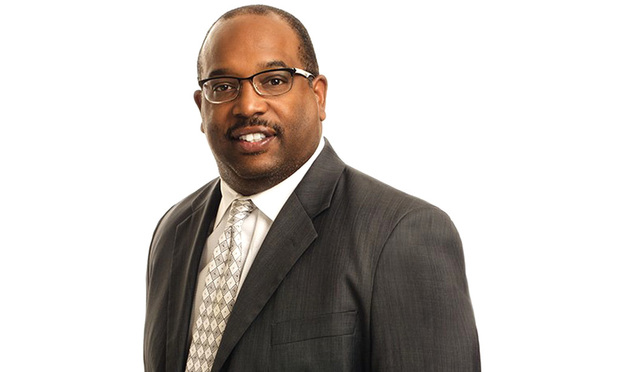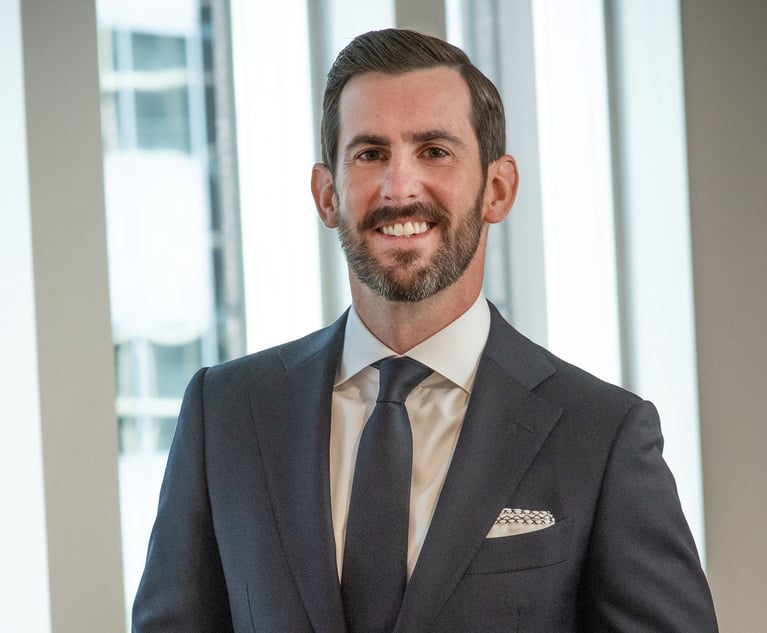Teaching Diversity, Inclusion and Belonging in Law School
Every law school in America should offer a class on diversity, inclusion and belonging to its students. Since 2016, I have taught a class titled "Diversity and Inclusion in the Legal Profession" at the University of Pennsylvania Law School.
October 15, 2019 at 01:34 PM
5 minute read
 Kassem L. Lucas partner with Pepper Hamilton.
Kassem L. Lucas partner with Pepper Hamilton.
Every law school in America should offer a class on diversity, inclusion and belonging to its students. Since 2016, I have taught a class titled "Diversity and Inclusion in the Legal Profession" at the University of Pennsylvania Law School. My class provides students with the knowledge and skills to navigate today's legal landscape and to improve diversity and inclusion in the legal profession.
I entered the practice of law more than 19 years ago, and I have been working to improve diversity and inclusion since then. Along with becoming a partner at Pepper Hamilton, I have served as vice chair, co-chair and chair of my firm's diversity committee since its inception, and I became the firm's partner in charge of diversity in 2011.
Throughout my career, I have learned how important diversity and inclusion are to firms, clients, law schools and the legal industry as a whole. In addition, experience tells me that diversity and inclusion responsibilities must be shared by everyone, from the top down. Thus, several years ago, it dawned on me that we should do more at the law school level to prepare future lawyers to think about, address and engage in ways to improve diversity and inclusion in the legal profession.
The course examines the trials and tribulations of trying to make the legal profession more diverse, teaches practical skills for better inclusiveness and belonging, and explores career options for someone seeking to use their legal background and experience to improve diversity and inclusion in the legal field. Through guest speakers, students get an opportunity to discuss legal diversity issues with a wide array of lawyers, legal educators, consultants and legal diversity professionals. For instance, leaders of affinity groups discuss with students the pros and cons of affinity groups, how one rises to lead an affinity group, and whether it is important for a practicing lawyer to join affinity groups.
We start the semester by discussing the ever-evolving definition of diversity. In addition to discussing the traditionally underrepresented groups—race, color, gender and LGBTQ+—we explore definitions that also include socio-economic status, veterans, attorneys with disabilities, gender identity, etc. We examine the diversity pipeline and ways to improve it. And we compare how the legal profession stacks up against other professions, such as medicine, business and accounting. We also examine diversity and inclusion in different legal sectors—private practice, in-house legal departments, public interest, government and the judiciary.
As law students, those in my class are very familiar with the recruiting process. We explore, with the help of diversity recruiters, law firm hiring professionals and law school career services representatives, the landscape of diversity recruiting and the hiring process. What works? What does not? What goes into creating a diverse class? We even explore resumes and what information employers seek when trying to find a "good candidate." Once lawyers are hired, we also look at the evaluation, advancement and promotion of attorneys and what role, if any, diversity plays in the retention of lawyers, particularly at law firms.
As mentioned above, one of the most important aspects of the class is when the students get to hear from other lawyers and diversity professionals. For instance, we have a class dedicated to women in the law, during which practicing female lawyers discuss their experiences and how to navigate the legal field. We also explore issues particular to women of color. We have a class where LGBTQ+ lawyers and allies share their perspectives on topics related to the LGBTQ+ legal community. We also dedicate a class to the perspectives of straight white males addressing diversity issues.
We explore topics that have the potential of affecting the workplace, including implicit/unconscious bias and generational diversity. We define implicit bias, recognize that we all have biases, and address ways to interrupt them. Likewise, we examine the modern workplace and how generational differences play a role in one's experience.
We examine the business case for diversity and how diversity can affect the bottom line. But we also look at legal diversity as a business itself. In addition to practicing law, one can find oneself on a career path to provide services addressing legal diversity. There are women and minority-owned vendors who provide services to the legal industry; consultants who train lawyers to deal with diversity issues; careers as diversity professionals at law firms and corporations; legal diversity organizations, such as the Leadership Council on Legal Diversity and Minority Corporate Counsel Association, dedicated to improving diversity; magazines and publications dedicated to promoting diversity; and surveys, rankings and awards administered by entities to help drive efforts to increase diversity in the legal profession.
At the end of the class, students are challenged to come up with practical solutions to improve diversity in the legal profession. Accordingly, if all law schools offered such a course, we would create a generation of lawyers who have the knowledge, skills and tools to join in the efforts to improve diversity, inclusion and belonging.
Kassem L. Lucas is a partner in the trial and dispute resolution practice group in the Philadelphia office of Pepper Hamilton. He concentrates his practice on complex commercial litigation, reinsurance law and arbitration, insurance counseling and insurance insolvency. Contact him at [email protected].
This content has been archived. It is available through our partners, LexisNexis® and Bloomberg Law.
To view this content, please continue to their sites.
Not a Lexis Subscriber?
Subscribe Now
Not a Bloomberg Law Subscriber?
Subscribe Now
NOT FOR REPRINT
© 2025 ALM Global, LLC, All Rights Reserved. Request academic re-use from www.copyright.com. All other uses, submit a request to [email protected]. For more information visit Asset & Logo Licensing.
You Might Like
View All
Saxton & Stump Lands Newly Retired Ex-Chief Judge From Middle District of Pa.
3 minute read
With New Civil Jury Selection Rule, Litigants Should Carefully Weigh Waiver Risks
6 minute read
Blank Rome Snags Two Labor and Employment Partners From Stevens & Lee
4 minute readTrending Stories
Who Got The Work
J. Brugh Lower of Gibbons has entered an appearance for industrial equipment supplier Devco Corporation in a pending trademark infringement lawsuit. The suit, accusing the defendant of selling knock-off Graco products, was filed Dec. 18 in New Jersey District Court by Rivkin Radler on behalf of Graco Inc. and Graco Minnesota. The case, assigned to U.S. District Judge Zahid N. Quraishi, is 3:24-cv-11294, Graco Inc. et al v. Devco Corporation.
Who Got The Work
Rebecca Maller-Stein and Kent A. Yalowitz of Arnold & Porter Kaye Scholer have entered their appearances for Hanaco Venture Capital and its executives, Lior Prosor and David Frankel, in a pending securities lawsuit. The action, filed on Dec. 24 in New York Southern District Court by Zell, Aron & Co. on behalf of Goldeneye Advisors, accuses the defendants of negligently and fraudulently managing the plaintiff's $1 million investment. The case, assigned to U.S. District Judge Vernon S. Broderick, is 1:24-cv-09918, Goldeneye Advisors, LLC v. Hanaco Venture Capital, Ltd. et al.
Who Got The Work
Attorneys from A&O Shearman has stepped in as defense counsel for Toronto-Dominion Bank and other defendants in a pending securities class action. The suit, filed Dec. 11 in New York Southern District Court by Bleichmar Fonti & Auld, accuses the defendants of concealing the bank's 'pervasive' deficiencies in regards to its compliance with the Bank Secrecy Act and the quality of its anti-money laundering controls. The case, assigned to U.S. District Judge Arun Subramanian, is 1:24-cv-09445, Gonzalez v. The Toronto-Dominion Bank et al.
Who Got The Work
Crown Castle International, a Pennsylvania company providing shared communications infrastructure, has turned to Luke D. Wolf of Gordon Rees Scully Mansukhani to fend off a pending breach-of-contract lawsuit. The court action, filed Nov. 25 in Michigan Eastern District Court by Hooper Hathaway PC on behalf of The Town Residences LLC, accuses Crown Castle of failing to transfer approximately $30,000 in utility payments from T-Mobile in breach of a roof-top lease and assignment agreement. The case, assigned to U.S. District Judge Susan K. Declercq, is 2:24-cv-13131, The Town Residences LLC v. T-Mobile US, Inc. et al.
Who Got The Work
Wilfred P. Coronato and Daniel M. Schwartz of McCarter & English have stepped in as defense counsel to Electrolux Home Products Inc. in a pending product liability lawsuit. The court action, filed Nov. 26 in New York Eastern District Court by Poulos Lopiccolo PC and Nagel Rice LLP on behalf of David Stern, alleges that the defendant's refrigerators’ drawers and shelving repeatedly break and fall apart within months after purchase. The case, assigned to U.S. District Judge Joan M. Azrack, is 2:24-cv-08204, Stern v. Electrolux Home Products, Inc.
Featured Firms
Law Offices of Gary Martin Hays & Associates, P.C.
(470) 294-1674
Law Offices of Mark E. Salomone
(857) 444-6468
Smith & Hassler
(713) 739-1250






